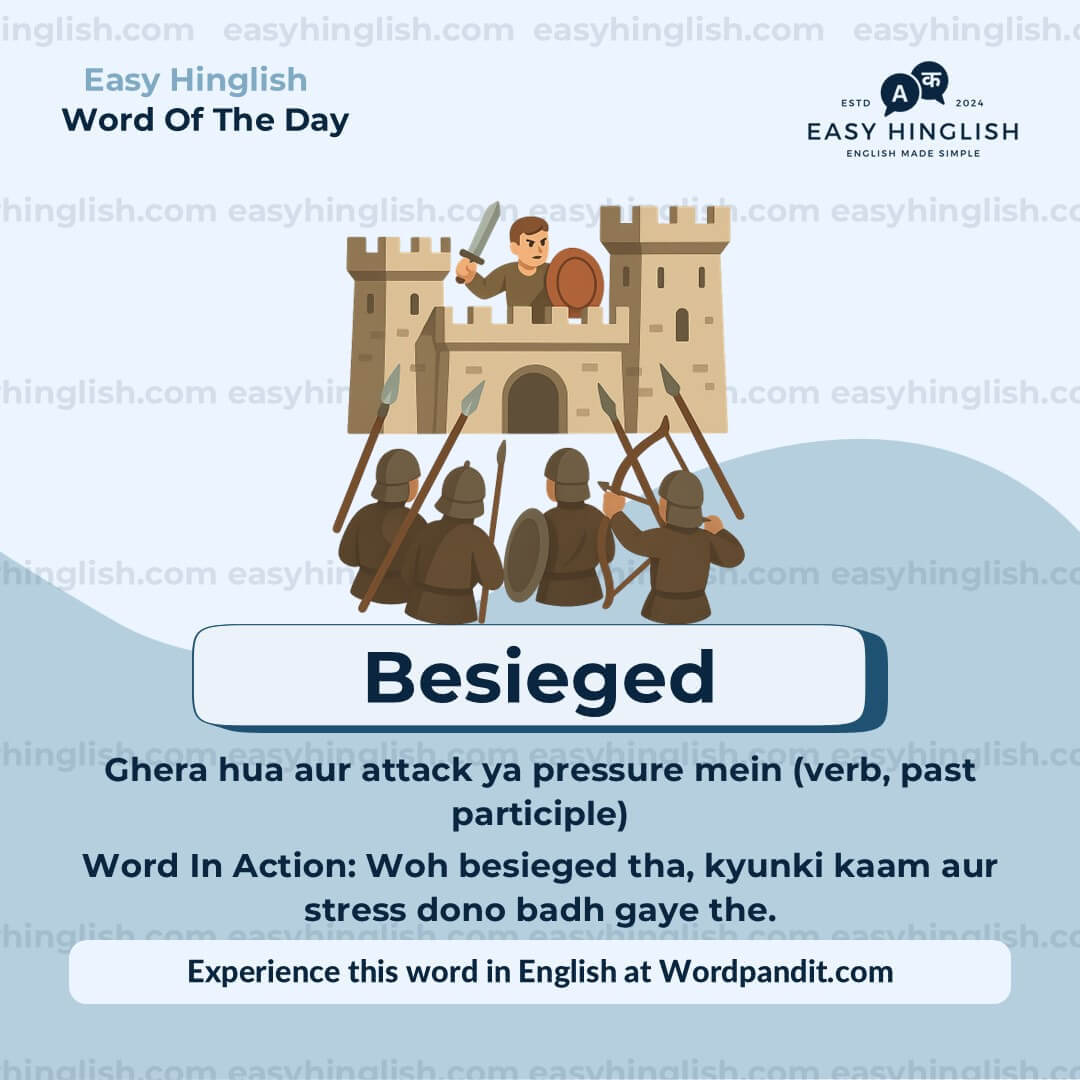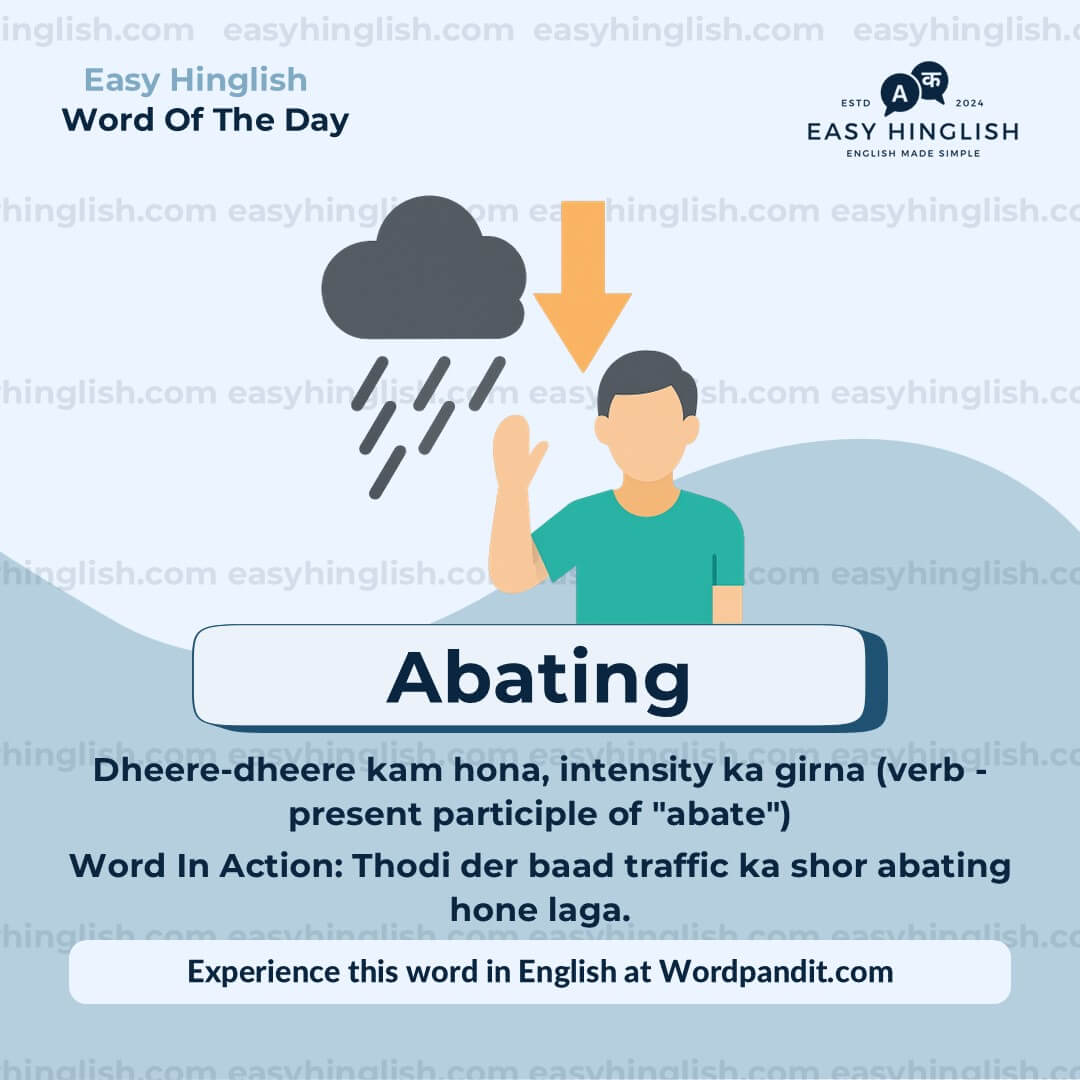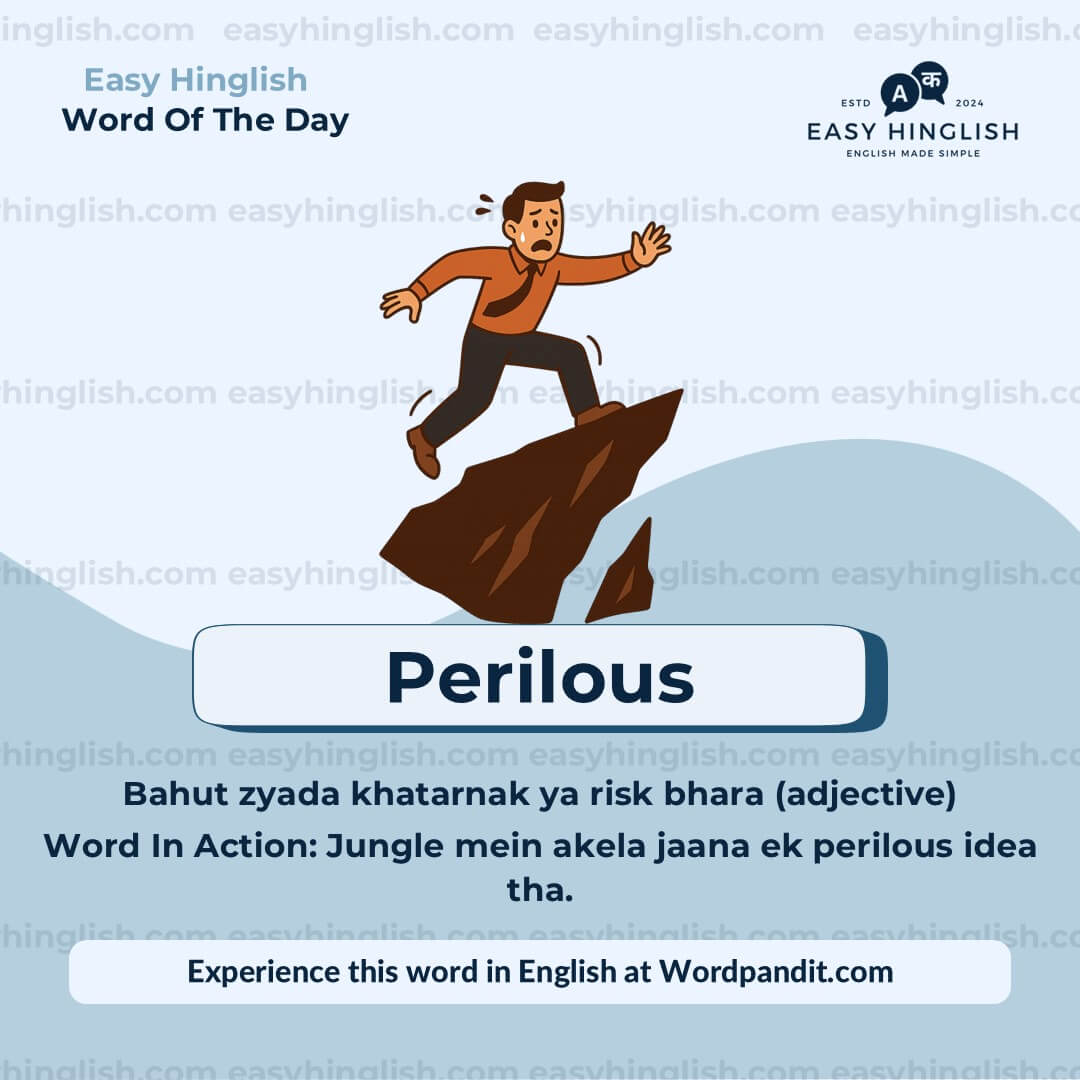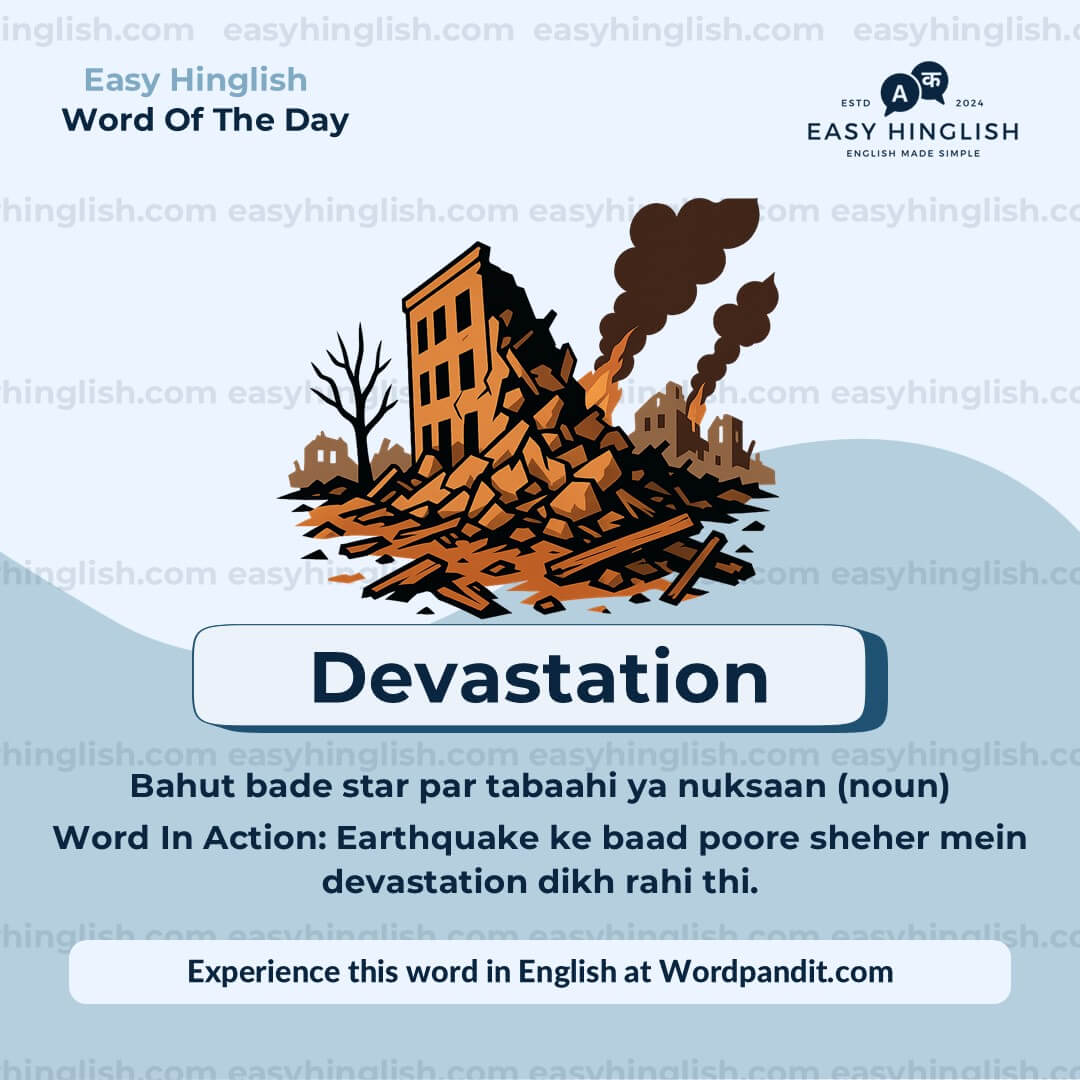Daily Vocabulary Indian Newspapers aur Publications se Seekho
Welcome to Wordpandit ka Indian Vocabulary Hub
Wordpandit par, hum samajhte hain ki ek achhi vocabulary develop karne ke liye local context samajhna bhi zaroori hai. Is section ka focus hai aapke vocabulary ko India ke leading newspapers aur publications se naye shabdon aur phrases ke zariye improve karna, taaki aap practical, relevant, aur uniquely Indian words seekh sakein.
Indian Sources Itne Important Kyun Hain?
Hum maante hain ki kisi bhi language ko sikhne ka sabse best tareeka hai uske local content me immerse hona. Isi wajah se hum carefully words curate karte hain top Indian newspapers aur publications se, jaise:
- The Hindu
- The Times of India
- The Economic Times
- Hindustan Times
- Live Mint
- The Indian Express
- Aur bhi bahut saare...
Hamesha Updated Raho, Hamesha Relevant Raho
Daily updates ke saath, aap Indian news sources se naye words seekhoge jo Indian society aur culture ke latest trends ko reflect karte hain. Hamara focus hai aise words provide karna jo aapke liye real-world me useful ho.
Wordpandit Aapke Learning Goals Ko Kaise Support Karta Hai?
Chahe aap exams ki preparation kar rahe ho, professional communication improve karna chahte ho, ya sirf naye words seekhna chahte ho, Wordpandit har step par aapki madad karega.
Practical Tareeke Se Seekho
Hamari interactive learning methodology me real-world examples, engaging activities, aur context-based usage shamil hain, taaki har naya shabd aapki active vocabulary ka hissa ban sake.
Aaj Hi Indian Vocabulary Seekhna Shuru Karo!
Wordpandit Kyun Choose Karein?
Practical Learning: Aise words seekho jo aapko real-world reading aur communication me sach me kaam aayenge, taaki aapki comprehension aur bolne ki skills improve ho.
Diverse Content: Current affairs se lekar scientific breakthroughs tak, hamare different sources aapko multiple domains ka vocabulary sikhate hain.
Effortless Integration: Wordpandit ko apni daily routine ka part banao. Sirf kuch minute har din dene se aapki vocabulary time ke saath kaafi improve ho sakti hai.
Aapka Vocabulary Mastery Tak Ka Safar
- Regularly hamare Daily Vocabulary section ko visit karo
- Naye words explore karo aur unka context me use samjho
- In words ko apni writing aur bolne ki practice me use karne ki koshish karo
- Jaise-jaise aapke words badhte hain, apni progress ko track karo
Aaj Se Apni Vocabulary Journey Shuru Karo!
Wordpandit ke saath vocabulary improve karna start karo. Roz thoda effort dalne se aap ek strong vocabulary develop kar sakte ho jo academic, professional, aur personal life me kaafi kaam aayegi.
Yaad rakho, ek naya shabd roz seekhna linguistic limitations ko door karne ka best tareeka hai! Wordpandit ko apni daily learning journey ka sathi banao aur vocabulary excellence ki taraf badho!
WORD-1: Rubble
Sandarbh (Context):
"Entire villages appear to have been reduced to rubble, with trees growing in places where houses once stood." - The Wire
Vyakhya (Explanatory Paragraph):
"Rubble" ka matlab hota hai tooti-phooti imaraton ke tukde — jaise pathar, eent, ya concrete ke chhote chhote hisse jo kisi building ke girne ke baad bache hote hain. Jab koi natural disaster (jaise earthquake) ya war hoti hai, toh uske baad ka jo scene hota hai, wahi rubble ke roop mein dikhai deta hai. Yeh shabd destruction aur collapse ko visually dikhata hai.
Arth (Meaning): Tooti-phooti imaraton ke tukde, debris (noun)
Uccharan (Pronunciation): ruh-buhl
Kathinai Star (Difficulty Level): ⭐⭐ Beginner
Utpatti (Etymology): Middle English "rubel" se aaya hai, jiska matlab tha "waste" ya "refuse", Old French "ruble" se nikla hai.
Prashant Sir Ke Tathya (Prashant Sir's Notes):
“Rubble” yaad rakhne ke liye sochiye ki koi purani building gir gayi hai, aur sirf uske pathar, eenton ke tukde bache hain. War zones aur earthquake areas mein yeh word kaafi common hai. Visualize ek gira hua ghar jisme sirf debris pada ho.
Samanarthi & Vipritarthi (Synonyms & Antonyms):
Samanarthi (Synonyms): debris, wreckage, ruins, fragments, remains
Vipritarthi (Antonyms): structure, construction, edifice, building
Udaharan (Usage Examples):
- Rescue team rubble ke neeche survivors ko dhoondhne ki koshish kar rahi thi.
- Bomb blast ke baad pura market area rubble mein tabdeel ho gaya tha.
Sanskritik Sandarbh (Cultural Reference):
"From the rubble of war, nations have rebuilt stronger and more united." — Yeh line kaafi baar documentaries aur historical films mein sunne ko milti hai. - Common Narrative
Sochiye (Think About It):
Kya aapko lagta hai ki "rubble" sirf physical destruction nahi, balki emotional ya societal breakdowns ko bhi represent kar sakta hai?
Chhoti Kriya (Quick Activity):
Ek chhoti paragraph likhiye jisme aap describe karein ki storm ke baad ka scene kaisa tha — "rubble" shabd ka kam se kam do baar upyog zaroor karein.
Yaad Karne Ka Tarika (Memory Tip):
Sochiye "rubble" matlab "ruins + bubbles" — sab kuch toot gaya aur bubble ki tarah chhote tukdo mein bikhar gaya.
Vastavik Jeevan Me Upyog (Real-World Application):
Disaster reports, war coverage, ya building demolitions ke news mein "rubble" kaafi use hota hai. Urban planning aur archaeological studies mein bhi yeh word commonly milta hai.
WORD-2: Besieged
Sandarbh (Context):
"Instead, Israeli authorities continue to actively block MSF and other humanitarian organisations from providing lifesaving assistance to people besieged and bombarded." - The New Indian Express
Vyakhya (Explanatory Paragraph):
"Besieged" ka matlab hota hai kisi jagah ya vyakti ko charo taraf se gher lena, taaki woh help ya escape na kar sake. Ye word zyada tar military ya crisis situations mein use hota hai. Lekin emotional ya social pressure ke liye bhi metaphorically use hota hai. Upar wale example mein, civilians war zone mein phas gaye hain—na woh bahar nikal pa rahe hain, na un tak madad pahuch rahi hai.
Arth (Meaning): Ghera hua aur attack ya pressure mein (verb, past participle)
Uccharan (Pronunciation): bih-seejd
Kathinai Star (Difficulty Level): ⭐⭐⭐ Intermediate
Utpatti (Etymology): Middle English "besiegen" se aaya hai, jiska matlab tha “charo taraf se baith kar gher lena” — be + siege (gheraav)
Prashant Sir Ke Tathya (Prashant Sir's Notes):
“Besieged” ko do tareeke se sochiye — ek toh physical gheraav, jaise army ne sheher ko gher liya ho. Doosra, emotional ya psychological pressure, jaise problems ya criticism ka gheraav. Har case mein yeh word helplessness aur tension ko dikhata hai.
Samanarthi & Vipritarthi (Synonyms & Antonyms):
Samanarthi (Synonyms): surrounded, trapped, encircled, harassed, under attack
Vipritarthi (Antonyms): free, liberated, safe, unconfined
Udaharan (Usage Examples):
- Woh besieged sheher mein reh rahe the jahan mahino se ration nahi pahucha.
- Office ke stress aur expectations ne use emotionally besieged kar diya tha.
Sanskritik Sandarbh (Cultural Reference):
"Sarajevo ka sheher Bosnian war ke dauraan lagbhag chaar saal tak besieged tha, jo modern history ki sabse lambi siege situations mein se ek hai." — Historical accounts
Sochiye (Think About It):
Kya aapke hisaab se kisi emotional ya social siege ka impact bhi utna hi gehra ho sakta hai jitna ek physical siege ka?
Chhoti Kriya (Quick Activity):
Do vaakya likhiye: ek jisme “besieged” ka military context ho aur doosra jisme psychological ya emotional context ho.
Yaad Karne Ka Tarika (Memory Tip):
“Be-seized” yaani sochiye aapko kisi ne chaaro taraf se gher liya ho—jaise aap seize kar liye gaye ho—that’s being besieged.
Vastavik Jeevan Me Upyog (Real-World Application):
News reports aur humanitarian updates mein “besieged” ka use war zones aur trapped populations ke liye hota hai. Lekin mental health, academic overload, ya kaam ke pressure ke liye bhi metaphorically iska upyog hota hai.
WORD-3: Abating
Sandarbh (Context):
"It has since evolved into a series of retaliatory attacks, creating a cycle of unrest that shows no signs of abating." - The Wire
Vyakhya (Explanatory Paragraph):
"Abating" ka matlab hota hai kisi cheez ka dheere-dheere kam hona — jaise gussa, dard, tufan, ya violence. Jab koi problem ya intense situation dheere se control mein aane lage, toh hum kehte hain ki woh abating hai. Upar wale sentence mein unrest abating nahi ho raha, yaani ki halaat abhi bhi intense bane hue hain.
Arth (Meaning): Dheere-dheere kam hona, intensity ka girna (verb - present participle of "abate")
Uccharan (Pronunciation): uh-bay-ting
Kathinai Star (Difficulty Level): ⭐⭐ Beginner
Utpatti (Etymology): Old French "abatre" se aaya hai, jiska matlab tha "to beat down" — Latin "battuere" (to beat) se nikla hai.
Prashant Sir Ke Tathya (Prashant Sir's Notes):
“Abating” ek common word hai jo news reports, legal aur medical language mein use hota hai. Jab koi problem dheere-dheere kam ho rahi ho — jaise conflict, pain ya protest — toh hum is word ka upyog karte hain. It suggests relief or improvement.
Samanarthi & Vipritarthi (Synonyms & Antonyms):
Samanarthi (Synonyms): diminishing, subsiding, easing, decreasing, waning
Vipritarthi (Antonyms): intensifying, escalating, increasing, rising
Udaharan (Usage Examples):
- Barish ke kai ghanton baad, tufan ab abating lag raha tha.
- Uska gussa apology ke baad bhi abating nahi hua.
Sanskritik Sandarbh (Cultural Reference):
"The Great Depression tab tak abating nahi hui jab tak strong policy reforms apply nahi kiye gaye." — Economic history texts
Sochiye (Think About It):
Kya aapko lagta hai ki kuch social ya political tensions itne deeply rooted hote hain ki woh aasani se abate nahi hote?
Chhoti Kriya (Quick Activity):
Kisi real-life ya news situation ke baare mein sochiye jahan kuch abating tha. “Abating” use karte hue ek sentence likhiye.
Yaad Karne Ka Tarika (Memory Tip):
“Abating” ko yaad rakhne ke liye sochiye “a-bait” — jaise bait (chara) dheere-dheere hata liya gaya ho — intensity ko peeche kheench lena.
Vastavik Jeevan Me Upyog (Real-World Application):
"Abating" word ka use legal cases mein nuisance ya fine kam hone ke liye hota hai, medical reports mein pain ke kam hone ke liye, aur news mein violence ya protest ke dheere hone ke context mein kiya jata hai.
WORD-4: Perilous
Sandarbh (Context):
"These unofficial borders have turned into perilous frontiers, where crossing over can have fatal consequences." - The Wire
Vyakhya (Explanatory Paragraph):
"Perilous" ka matlab hota hai bahut zyada khatarnak ya risky. Jab kisi situation mein jaan ka khatra ho ya koi serious threat ho, tab hum is word ka use karte hain. Upar wale context mein yeh dikhata hai ki borders par halat itne unstable ho gaye hain ki unko paar karna jaanleva ho sakta hai.
Arth (Meaning): Bahut zyada khatarnak ya risk bhara (adjective)
Uccharan (Pronunciation): peh-ruh-luhs
Kathinai Star (Difficulty Level): ⭐⭐⭐ Intermediate
Utpatti (Etymology): Old French "perilous" se aaya hai, jo Latin "periculosus" (dangerous) se nikla hai — "periculum" ka matlab danger hota hai.
Prashant Sir Ke Tathya (Prashant Sir's Notes):
Jab bhi "perilous" shabd suno, "peril" yaani danger ko yaad karo. Ye ek formal aur serious word hai jo adventure stories, history books, aur news reports mein commonly use hota hai. Iska use tab karo jab danger sach mein serious ho.
Samanarthi & Vipritarthi (Synonyms & Antonyms):
Samanarthi (Synonyms): dangerous, hazardous, risky, unsafe, treacherous
Vipritarthi (Antonyms): safe, secure, harmless, protected
Udaharan (Usage Examples):
- Sunset se pehle hikers ek perilous mountain trail par nikal pade.
- Regime ke khilaaf bolna ek perilous act of bravery tha.
Sanskritik Sandarbh (Cultural Reference):
"Frodo aur Sam ek perilous quest par nikle the One Ring ko destroy karne ke liye." — *The Lord of the Rings* by J.R.R. Tolkien
Sochiye (Think About It):
Kya wajah hoti hai ki log perilous situations mein bhi risk lena chahte hain, jabki unhe khatre ka pata hota hai?
Chhoti Kriya (Quick Activity):
Teen aise professions list kijiye jo perilous hote hain, aur batayein ki har ek kyun risky mana jata hai.
Yaad Karne Ka Tarika (Memory Tip):
Sochiye: “Perilous = Peril + us” — jab danger humare aas-paas ho, tab situation hoti hai perilous.
Vastavik Jeevan Me Upyog (Real-World Application):
"Perilous" word ka use journalism, political discussions, aur storytelling mein hota hai jab kisi serious threat ya dangerous journey ko describe karna ho — jaise refugees ki journey, disaster zones mein kaam karna, ya high-risk leadership decisions.
WORD-5: Devastation
Sandarbh (Context):
"Following satellite images captured by The Wire reveal the full extent of the devastation. These images were captured in early 2025." - The Wire
Vyakhya (Explanatory Paragraph):
"Devastation" ka matlab hai kisi jagah ka puri tarah se tabaah ho jaana — jaise war, natural disaster, ya kisi bade attack ke baad hota hai. Ye shabd sirf physical damage nahi, balki emotional aur social loss ko bhi dikhata hai. Upar ke sentence mein satellite images dikhate hain ki kis had tak tabahi hui hai—shahid tooti imaratein, jali hui zameen, ya collapsed infrastructure.
Arth (Meaning): Bahut bade star par tabaahi ya nuksaan (noun)
Uccharan (Pronunciation): deh-vuh-stay-shuhn
Kathinai Star (Difficulty Level): ⭐⭐ Beginner
Utpatti (Etymology): Latin se aaya hai "devastatio" jiska matlab hai "to lay waste" — sab kuch barbaad kar dena
Prashant Sir Ke Tathya (Prashant Sir's Notes):
“Devastation” aksar kisi bade calamity ke baad ka scene dikhata hai — jaise ek tornado ke baad poora sheher mit gaya ho. Ye sirf buildings ki tabahi nahi hoti, emotional devastation bhi hoti hai — jaise kisi apne ke loss ke baad ka emotional pain.
Samanarthi & Vipritarthi (Synonyms & Antonyms):
Samanarthi (Synonyms): destruction, ruin, desolation, wreckage, havoc
Vipritarthi (Antonyms): restoration, repair, renewal, reconstruction
Udaharan (Usage Examples):
- Bhookamp ne pure sheher mein devastation ka ek daravna scene chhod diya.
- Apne parivaar ko kho dena uske liye emotional devastation tha.
Sanskritik Sandarbh (Cultural Reference):
"Hiroshima aur Nagasaki ki devastation ne duniya ki history ka rukh badal diya." — World War II ke historical accounts
Sochiye (Think About It):
Jab kisi vyakti ya samaj par devastation hoti hai — physical ya emotional — toh kya woh waapas pehle jaisa ban sakta hai? Kaise?
Chhoti Kriya (Quick Activity):
News se kisi recent disaster ya conflict ka example sochiye. Ek vaakya likhiye jisme "devastation" shabd ka upyog ho.
Yaad Karne Ka Tarika (Memory Tip):
“Devastation = ‘de’ (down) + ‘vast’ (huge)” — sochiye ek vast area jo niche gir gaya ho, yaani poori tarah se tabaah ho gaya ho.
Vastavik Jeevan Me Upyog (Real-World Application):
"Devastation" word ka use journalism, humanitarian reports, aur mental health discussions mein hota hai, jab kisi bade loss ya damage ko describe karna ho — chaahe woh physical ho ya emotional.













